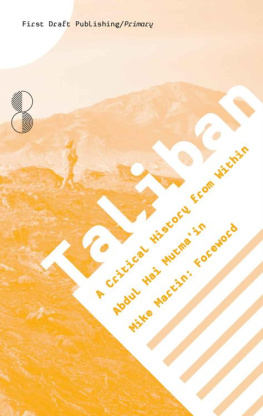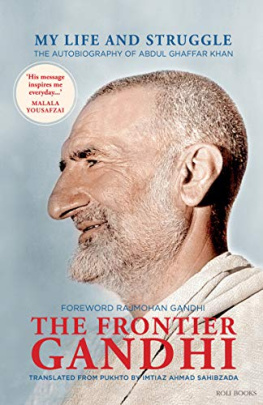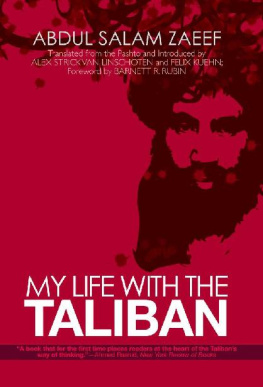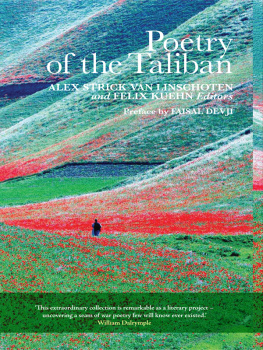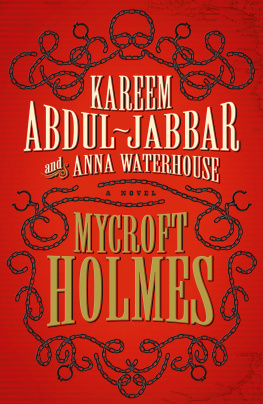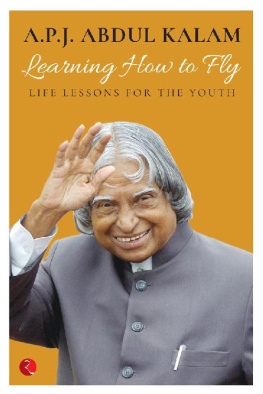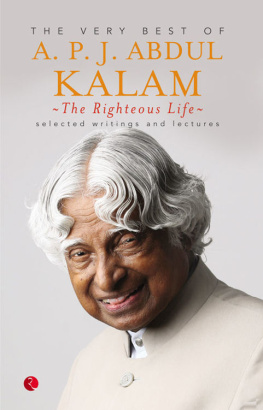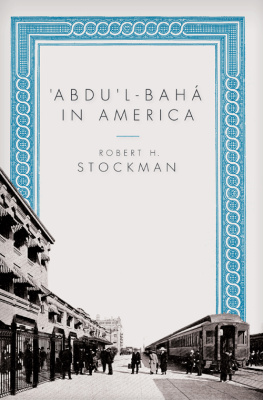Abdul Hai Mutmain - Taliban: A Critical History from Within
Here you can read online Abdul Hai Mutmain - Taliban: A Critical History from Within full text of the book (entire story) in english for free. Download pdf and epub, get meaning, cover and reviews about this ebook. year: 2019, publisher: First Draft Publishing, genre: Politics. Description of the work, (preface) as well as reviews are available. Best literature library LitArk.com created for fans of good reading and offers a wide selection of genres:
Romance novel
Science fiction
Adventure
Detective
Science
History
Home and family
Prose
Art
Politics
Computer
Non-fiction
Religion
Business
Children
Humor
Choose a favorite category and find really read worthwhile books. Enjoy immersion in the world of imagination, feel the emotions of the characters or learn something new for yourself, make an fascinating discovery.
- Book:Taliban: A Critical History from Within
- Author:
- Publisher:First Draft Publishing
- Genre:
- Year:2019
- Rating:3 / 5
- Favourites:Add to favourites
- Your mark:
- 60
- 1
- 2
- 3
- 4
- 5
Taliban: A Critical History from Within: summary, description and annotation
We offer to read an annotation, description, summary or preface (depends on what the author of the book "Taliban: A Critical History from Within" wrote himself). If you haven't found the necessary information about the book — write in the comments, we will try to find it.
Taliban: A Critical History from Within — read online for free the complete book (whole text) full work
Below is the text of the book, divided by pages. System saving the place of the last page read, allows you to conveniently read the book "Taliban: A Critical History from Within" online for free, without having to search again every time where you left off. Put a bookmark, and you can go to the page where you finished reading at any time.
Font size:
Interval:
Bookmark:
Abdul Hai Mutmain: Taliban
A Critical History from Within
First Draft Publishing/ Primary
Abdul Hai Mutmain: Taliban
A Critical History from Within
Mike Martin: Foreword

First published in Pashto in Afghanistan in 2019.
First published in English in Germany in 2019
by First Draft Publishing GmbH,
Abdul Hai Mutmain 2019
Foreword: Dr. Mike Martin 2019
Editors: Alex Strick van Linschoten,
Saba Imtiaz, and Felix Kuehn 2019
ISBN 978-3-944214-28-3 (softcover)
ISBN 978-3-944214-27-6 (kindle)
ISBN 978-3-944214-26-9 (epub)
Cover Photography: Philip Poupin
www.philippoupin.fr
Concept & Design: Bureau Christoph Dunst
www.christophdunst.com
Typefaces: Heimat Mono www.atlasfonts.com & Arnhem www.ourtype.be
All rights reserved. Alle Rechte vorbehalten.
First Draft Publishing GmbH, Berlin
printed in Germany.
www.firstdraft-publishing.com
info@firstdraft-publishing.com
Table of Contents
Dr. Mike Martin:
Foreword
The Taliban have been the subject, or more precisely the object, of a wide variety of scholarly and journalistic works. Indeed, a large number of books have been written about Afghanistans recent historysince the Communist revolution and takeover in April (Saur) 1978yet insight about Afghanistan, and particularly the Taliban, is surprisingly hard to come by.
Often, little is written beyond tired clichs of the Talibans treatment of women or stereotyped views of their relationship with al-Qaeda. They are barbaric, primal, almost animal. Most works on the Taliban, with one or two notable exceptions, do not stray from these central narratives. Why is this?
For me, the answer lies in the tangled and emotive concept of otherness, so well described by Edward Said in his now-classic work, Orientalism, which came out the same year1978as the Saur Revolution in Afghanistan. The Taliban are the other. Perhaps among the most extreme examples of the other that we as Westerners, or Progressives, or Liberals, (all loaded terms, I accept) are faced with in the modern day.
How can one understand, for example, the lashing and beating of women for wearing shoes that make a noise? The removal of musicthat basic human therapyfrom the public sphere? The destruction of irreplaceable artwork? One cannot. And by othering the Taliban, we condemn these acts but, more importantly, we reinforce our sense of who we are, ourselves. We stand in tension to them.
This is no way to develop understanding of Afghanistan, and those involved and wrapped up in the Afghan conflict; we are lucky, therefore, to have Taliban: A Critical History from Within by Abdul Hai Mutmain.
Mutmain is the Talibans most well-known media operator, working as personal spokesman of the Taliban leader, Mullah Omar, for more than a decade. He stands witness to the inner workings of the central hierarchy of the Taliban, from their ascent to power, through the period of the Taliban government and its collapse, as well as their re-emergence as a reaction to the government and international actors in the post-2001 period.
On one level Taliban: A Critical History from Within is a personal memoir. As such, we should expect it to be subjective and weighted towards the author, and those with whom he has sympathy. It is all these things; very much so. This somewhat diminishes its value as an insiders account of the Taliban.
But this subjectivity is in itself useful to the scholar as it shows us how the Taliban, and Mutmain wish to be perceived. We learn about the Talibans worldview. And this is where the subjective bias of the author is at its most useful. As the Afghan war cycles and continues, and enters new phases of hopeful peace negotiations, this information becomes ever more important.
Additionally, and as already highlighted, the literature on Afghanistan draws from a remarkably small set of data. The numerous general histories of the period covered by this book often draw from the same data; the same anecdotes and points of view often appear in several works.
Taliban: A Critical History from Within covers the same events, from the rise of the Taliban movement in 1994, through the period of the Taliban Emirate, when the movement controlled Kabul and up to 90% of the country (1996-2001), to the fall of the Taliban (2001) and the post-2004 resurgence of the movement. But they are covered in detail enough to delight a historian.
But most importantly, in my opinion, Mutmains book reveals the complexities of and within the Taliban movement, where our understanding of them is dominated through seeing others as simplistic and evil. In Taliban: A Critical History from Within we learn of the Talibans own struggles with factionalisation within the movement; we learn of the difficulties in dealing with foreign powers that we normally ascribe as friendly to the Taliban; and we learn of just how extensively the Taliban are intertwined with the mujahedeen (and communist) landscape in Afghanistan from the 1980s.
In a world where the British government tries to suppress literature that tells Afghan stories from the war, or in which the British library declines to host an archive of Taliban documents because it is worried about contravening anti-terror laws, Alex Strick van Linschoten and Felix Kuehn and their publishing house First Draft Publishing are to be applauded.
It is only through the study of the other that we can hope to bring an end to conflict.
Mike Martin
London
July 2019
Preface
I was around three or four years old when the Communists led the bloodiest coup in Afghanistan. KhAD personnel were arresting the faithful. One day, a few ugly moustached men knocked on our door. My father left with them and then he never came back. We never saw him again.
After a year, I began to understand that this kind person was no longer with me. Poverty, a cold fireplace, and my old clothes made it evident I was an orphan. Every man with a moustache looked like my fathers murderer. My uncle took us with him to another village, and we no longer had a home of our own.
When the Afghan communists were unable to control the situation, they brought in the Soviet communists along with their killer aeroplanes. The Red Army created a situation like the Day of Judgment in the entire country. We were not the only unfortunate orphaned children whose days of playing were marked by flames and fire, murders, and aerial bombardment. Man-made technology seemed more brutal to us than humans. We called the Russian convoy of war, weapons, tanks and vehicles quwwa force.
In the name of punishing miscreants, Russian forces used to enter villages and show their brutality to Afghans. They targeted every living being including children and animals. During our childhood, we always saw bloodstained corpses and bombed houses, and the name of the Red Army was akin to thunder.
One day, I woke up, washed my face, and had my breakfast of green tea and dry bread. I heard the heavy sounds of tanks and screams of fear. I was scared. The villagers freed their animals so they could escape. People were running in the streets like their houses were haunted. Women, old men, and children were all running on the path, sometimes looking behind them. My elder brother and I went to the fields, and ran alongside a deep narrow canal. We felt the danger from the helicopter gunfire and hid in a dry canal filled with stones and branches. We were fearful and spent all day hiding in the canal without moving and talking to each other.
When the forces left in the afternoon, fathers and mothers started to search for their children and animals in the fields. As children, we understood that even though we were young, we could not save ourselves from armed men.
Next pageFont size:
Interval:
Bookmark:
Similar books «Taliban: A Critical History from Within»
Look at similar books to Taliban: A Critical History from Within. We have selected literature similar in name and meaning in the hope of providing readers with more options to find new, interesting, not yet read works.
Discussion, reviews of the book Taliban: A Critical History from Within and just readers' own opinions. Leave your comments, write what you think about the work, its meaning or the main characters. Specify what exactly you liked and what you didn't like, and why you think so.

